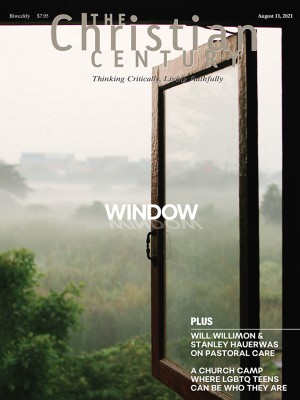It takes faith to resist the attention economy
We need to relearn a capacity to dwell in God’s presence.

The day I started my sabbatical, I found myself wandering the aisles of Target. I am enough of a suburban middle-aged White lady that Target trips are inherently delightful—or at least they used to be, before the pandemic drained the pleasure from any sort of public activity. Feeling like I had all the time in the world, I browsed the book aisle. I nearly chuckled into my face mask when a paperback caught my attention: How to Do Nothing, by Jenny Odell. Of course I bought the book. Considering that my original sabbatical plan consisted of once-in-a-lifetime overseas trips and, comparatively, my pandemic sabbatical would consist of doing a whole lot of nothing, I figured I needed the handbook.
As many of the less-than-effusive reader reviews will tell you, Odell’s book isn’t really about doing nothing. Full disclosure: I was less than effusive in my own brief Goodreads take on the book. I had wanted to learn how to do nothing, but instead Jenny Odell made me think very hard about something. The real thrust of the book is located in its subtitle, which I barely noticed as I dropped it in my red cart: Resisting the Attention Economy.
Read our latest issue or browse back issues.
It seems lots of folks are paying attention to the so-called attention economy these days. This winter, a New York Times op-ed by Charlie Warzel featured the work of Michael Goldhaber, a theoretical physicist who popularized the concept of a zero-sum economy of attention decades ago. “In an attention economy, one is never not on, at least when one is awake, since one is nearly always paying, getting or seeking attention,” Goldhaber once observed (shortly before Facebook launched its attention-captivating, endlessly scrolling News Feed, Warzel notes).
Attention is one of our most valuable resources, and everyone wants a piece of it: politicians and advertisers, influencers and friends (whatever that means now that we tend to friend people more often than we actually befriend them). We know that advertisers are paying for our attention and that social media networks are getting savvier at capturing it for a profit. (If you don’t know this, watch The Social Dilemma on Netflix.) Many of us are more mindlessly addicted to the internet than ever before, thanks to the way the pandemic abruptly collapsed our worlds into the glowing rectangles of our handheld devices. The consensus seems to be that the attention economy is inevitable and inescapable, and that it is directly responsible for the ongoing disintegration of truth and civility in our culture—the internet continues to host countless cesspools of outrage and radicalization.
And yet, one of the issues we faced at my church in the bleak midwinter of the pandemic was a precipitous decline in online engagement. We kept telling ourselves people were burned out on screens, so when I read Carey Nieuwhof’s article “Seven Weird Lies about Online Church Pastors Need to Stop Believing,” this line really stung: “If you think people are screened out, run your theory by TikTok or Instagram. Apparently, people aren’t nearly as done with screens as you [church leaders] think.”
Perhaps it’s too much for us, in the long run, to “go to church” on the same devices used to order toilet paper and skim endlessly refreshing news feeds and, statistically speaking, access pornography. Or perhaps it’s something bleaker. David Foster Wallace famously noted, “Everybody worships. The only choice we get is what to worship.” If worship is a form of attention, it sure seems like many of us are actually worshiping our phones. Maybe we’re not “screened out” so much as unable to bear the disgusting contradiction of worshiping God on the device we’ve been tricked into worshiping.
Odell offers an antidote to our screen addiction: doing something that might look like doing nothing. “Solitude, observation, and simple conviviality should be recognized not only as ends in and of themselves,” she writes, “but inalienable rights belonging to anyone lucky enough to be alive.” For her part, Odell finds great joy and meaning in observing birds. She doggedly learns to identify countless species by sight and sound. Attention paid to pelicans is attention withheld from influencers. Bird-watching is her preferred form of “doing nothing.” Though I considered oriole sightings the highlight of 2020, my preferred form of doing nothing is worship—though I do prefer the shoulder-to-shoulder sort, in which congregations sang hymns lustily enough to make the ghost of John Wesley swoon.
When even our worship is ripped out of the context of community and sacred space, it sure feels like YouTube is winning. But maybe we really can pay attention to where we are paying attention—and wrest this most precious resource from the thrall of algorithms.
I suspect spiritual leaders are going to have to be blunt with ourselves and our congregations. The “content” we are faithfully uploading to our church accounts cannot compete with TikTok. There will be some churches that try to compete on the popularity plane; there always have been. Ultimately I think the old hymn gives the best counsel: “Turn your eyes upon Jesus.” If we are to be worshipers of God, disciples of Christ, and members of the church, we are going to have to intentionally redirect our attention upon these things, numinous and ordinary alike. Even if there isn’t a dopamine hit to be found—especially when there isn’t a dopamine hit to be found.
We need to relearn a capacity to dwell in God’s presence. We need to cultivate the sort of resilient solitude immune to the temptation to check for notifications. We need to be neighbors before we are consumers. We need to immerse ourselves in holy scripture, even if it seems a bit boring compared to whatever is trending on Twitter.
If, as Odell suggests, “to behold is to become beholden to,” Christians must behold Christ. Again and again, until we are beholden. And even still, again.
A version of this article appears in the print edition under the title “What we behold.”






